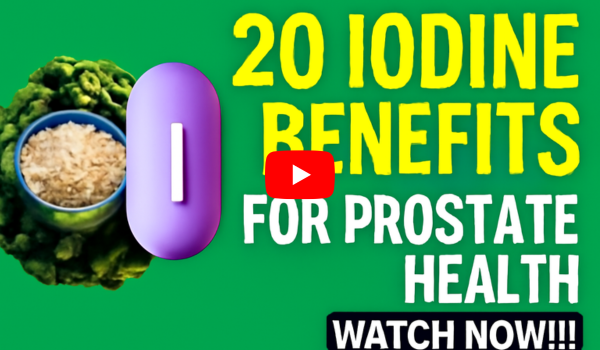Iodine for Prostate Health: Exploring the Benefits
The prostate is a small but essential gland in the male reproductive system. As men age, the prostate can face a range of challenges, from benign prostatic hyperplasia (BPH) to more serious conditions like prostatitis or prostate cancer.
Iodine for Prostate Health | Powerful Benefits to Support Prostate Wellness [2025]
As a result, maintaining prostate health becomes a priority, and while we often hear about the importance of a balanced diet, exercise, and regular medical checkups, certain nutrients can also play an important role in supporting prostate wellness.
One such nutrient that is increasingly being studied for its potential benefits is iodine. While iodine is best known for its role in thyroid health, its effects on prostate health are gaining attention.
This blog will delve into the relationship between iodine and prostate health, explore the science behind it, and help you understand whether incorporating iodine into your diet might benefit you.
Understanding Iodine: A Vital Nutrient
Iodine is an essential trace element that the body needs in small amounts to function properly.
It is most commonly associated with the thyroid gland, where it is used to produce thyroid hormones that regulate various bodily functions, including metabolism, energy levels, and growth.
However, iodine is involved in more than just thyroid function, and its benefits extend to other systems in the body, including the prostate.
Iodine is found in several foods, with the most common sources being seafood (such as fish and seaweed), dairy products, eggs, and iodized salt.
Iodine deficiency can lead to thyroid dysfunction, which in turn can cause a range of health problems, including goiter, hypothyroidism, and cognitive issues. While iodine deficiency is rare in countries that use iodized salt, suboptimal iodine levels may still affect some individuals.
The Link Between Iodine and Prostate Health
The relationship between iodine and prostate health is a developing area of research. While iodine’s role in thyroid health is well established, its direct effects on the prostate remain less understood.
However, several mechanisms and studies suggest that iodine may help support prostate health in some ways.
1. Antioxidant and Anti-inflammatory Properties
One of iodine’s most promising benefits for prostate health is its potential to reduce inflammation and oxidative stress. Chronic inflammation is a well-known risk factor for various types of cancer, including prostate cancer.
Oxidative stress, which occurs when there is an imbalance between free radicals and antioxidants in the body, can lead to cellular damage, mutations, and the development of cancerous cells.
Iodine is believed to have antioxidant properties, meaning it may help protect prostate cells from oxidative damage.
It has been shown to neutralize free radicals and reduce inflammation in the body, both of which are critical factors in preventing the initiation and progression of prostate diseases.
Several studies suggest that antioxidants, including iodine, can help reduce inflammation in the prostate and lower the risk of prostate cancer.
2. Thyroid Function and Hormonal Balance
Iodine’s primary function in the body is supporting thyroid health. The thyroid produces hormones that help regulate metabolism, but these hormones also influence the growth and function of other tissues, including the prostate.
The thyroid hormones, particularly T3 (triiodothyronine) and T4 (thyroxine), have been shown to interact with prostate cells and influence their behavior.
Research suggests that an imbalance in thyroid hormones can affect prostate size and function. For example, hypothyroidism (low thyroid function) has been linked to an increased risk of benign prostatic hyperplasia (BPH), a condition in which the prostate enlarges and causes urinary problems.
On the other hand, excessive thyroid hormone levels (hyperthyroidism) may lead to increased cell proliferation in the prostate, which could potentially raise the risk of prostate cancer.
By supporting proper thyroid function, iodine helps maintain hormonal balance, which in turn supports prostate health.
3. Iodine and Prostate Cancer: What the Research Shows
Prostate cancer is one of the most common cancers in men, and it is often associated with increased oxidative stress, inflammation, and hormonal imbalances. Iodine’s potential anti-cancer properties are being explored in the context of prostate cancer prevention and treatment.
A 2017 study published in the Journal of Clinical Endocrinology & Metabolism suggested that iodine deficiency may be linked to an increased risk of prostate cancer.
The study found that men with lower levels of iodine had a higher incidence of prostate cancer, particularly in areas where iodine deficiency is more common.
Additionally, laboratory studies have shown that iodine may help inhibit the growth of prostate cancer cells by promoting cell apoptosis (programmed cell death) and reducing cell proliferation.
Another study conducted by the National Institutes of Health (NIH) explored the effect of iodine supplementation on prostate cancer cell lines.
The results showed that iodine supplementation slowed down the growth of prostate cancer cells and inhibited their ability to spread.
This suggests that iodine could have a protective role in preventing the spread of prostate cancer, though more clinical research is needed to confirm these findings.
4. Supporting the Immune System
Iodine is also known to support the immune system, which is essential for fighting off infections, inflammation, and cancerous cells.
A strong immune system plays a crucial role in protecting the prostate from infection and inflammation, both of which can contribute to the development of prostate disease.
By supporting immune function, iodine may help reduce the risk of prostatitis (inflammation of the prostate) and other prostate conditions.
5. Iodine and Prostatitis
Prostatitis is an inflammatory condition that can cause pelvic pain, urinary issues, and sexual dysfunction.
It can be caused by bacterial infections or other factors, including chronic inflammation. As iodine has anti-inflammatory properties, it may help reduce inflammation in the prostate and alleviate the symptoms associated with prostatitis.
While more studies are needed to establish iodine’s role in managing prostatitis specifically, its ability to reduce general inflammation and support immune function makes it a potential therapeutic option for men with this condition.
How to Incorporate Iodine into Your Diet
While iodine is an essential nutrient, most people get enough iodine from their diet, especially if they consume iodized salt or seafood.
However, if you suspect that you might not be getting enough iodine, or if you have specific concerns about prostate health, there are several ways to ensure you’re consuming enough iodine:
1. Eat Iodine-Rich Foods
The best way to get iodine is through your diet. Some iodine-rich foods include:
- Seafood: Fish, shellfish, and seaweed (especially kelp, nori, and wakame)
- Dairy Products: Milk, yogurt, and cheese
- Eggs: Particularly the yolks
- Iodized Salt: Many countries use iodine to fortify table salt, so using iodized salt in cooking can boost your iodine intake.
- Fruits and Vegetables: While most plant-based foods contain very little iodine, some plants grown in iodine-rich soil, such as potatoes and cranberries, can provide small amounts.
2. Iodine Supplements
If you’re unable to meet your iodine needs through food alone (e.g., due to dietary restrictions or living in areas with iodine-deficient soil), iodine supplements are available.
However, it’s important to use iodine supplements with caution, as excessive iodine intake can have adverse effects on thyroid function.
Always consult with a healthcare provider before starting iodine supplementation, especially if you have thyroid issues.
3. Monitor Iodine Intake
While iodine deficiency is rare, excessive iodine intake can lead to thyroid dysfunction. It’s important to stay within the recommended dietary intake levels.
The recommended daily intake for iodine is 150 micrograms for adults. Pregnant and breastfeeding women may need higher amounts (220–290 micrograms per day).
Keep track of iodine-rich foods and supplements to ensure you’re not exceeding the safe upper limit.
The Future of Iodine and Prostate Health Research
While the research on iodine and prostate health is still in its early stages, the potential for iodine to play a role in supporting prostate health is promising.
Studies on iodine’s antioxidant, anti-inflammatory, and anti-cancer properties suggest it could be a valuable addition to the prostate health regimen, particularly for men at risk of prostate cancer or other prostate conditions.
However, more large-scale, long-term clinical trials are needed to confirm the full extent of iodine’s effects on the prostate and to determine the optimal dosage for prostate health.
It’s important to remember that iodine should be seen as part of a broader approach to prostate health. Maintaining a healthy diet, staying active, managing stress, and getting regular checkups are all crucial components of keeping your prostate healthy as you age.
Conclusion: Is Iodine the Missing Link for Prostate Health?
Iodine may not be the first nutrient that comes to mind when you think about prostate health, but its potential benefits are compelling.
From supporting thyroid function and hormonal balance to reducing inflammation and oxidative stress, iodine appears to play an important role in maintaining prostate wellness.
While iodine is not a miracle cure for prostate diseases like BPH or prostate cancer, it may offer a natural, supportive way to protect the prostate and improve overall health.
As research continues to explore iodine’s effects on prostate health, it’s important to incorporate iodine-rich foods into your diet and ensure you’re getting enough of this essential nutrient.
If you have concerns about your prostate health or iodine intake, be sure to discuss them with your healthcare provider. They can guide you on the right approach based on your specific health needs and ensure that your iodine intake is appropriate for your overall wellness.
.
.




